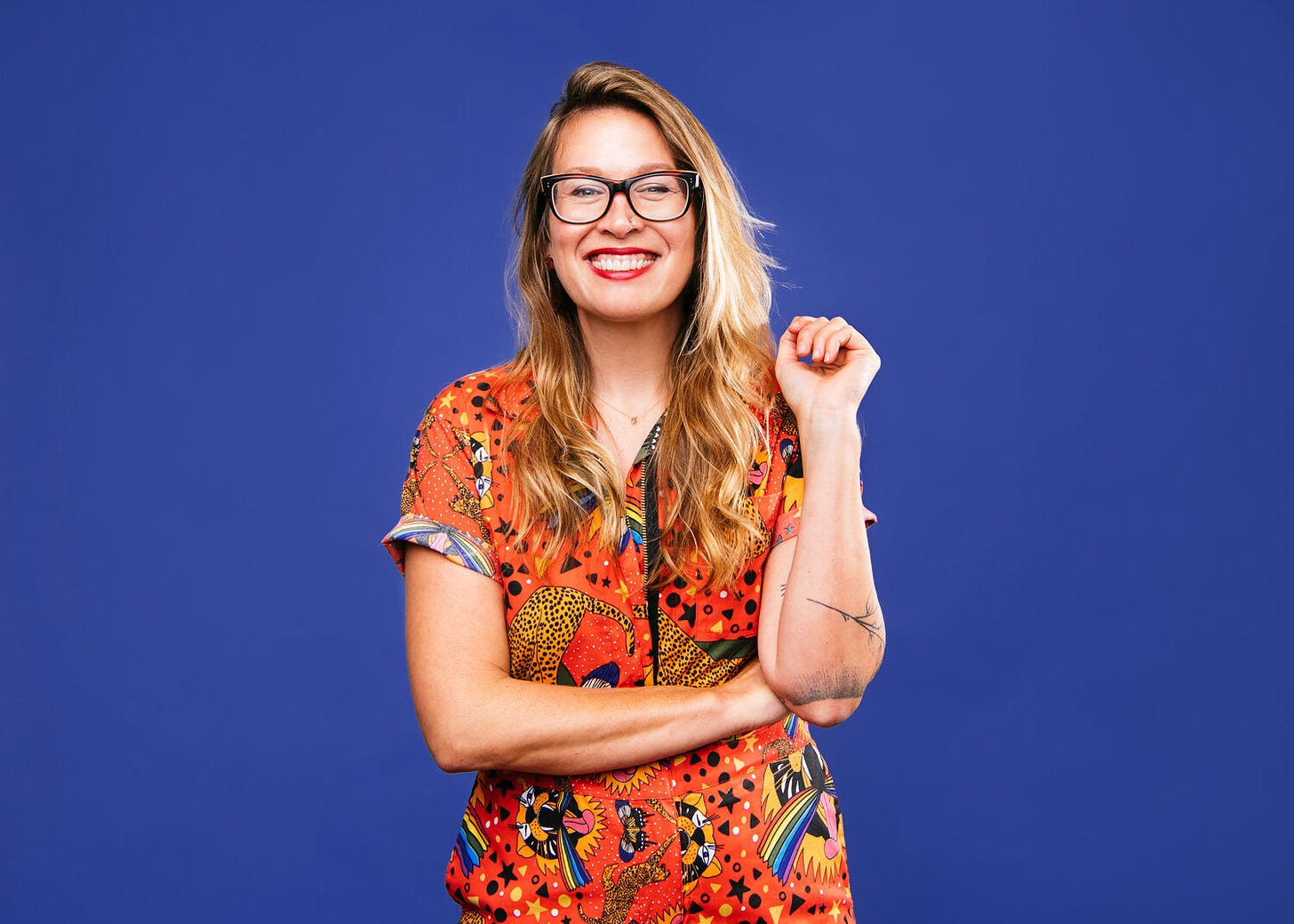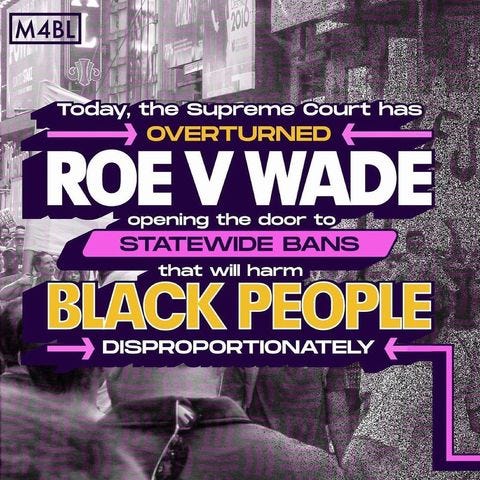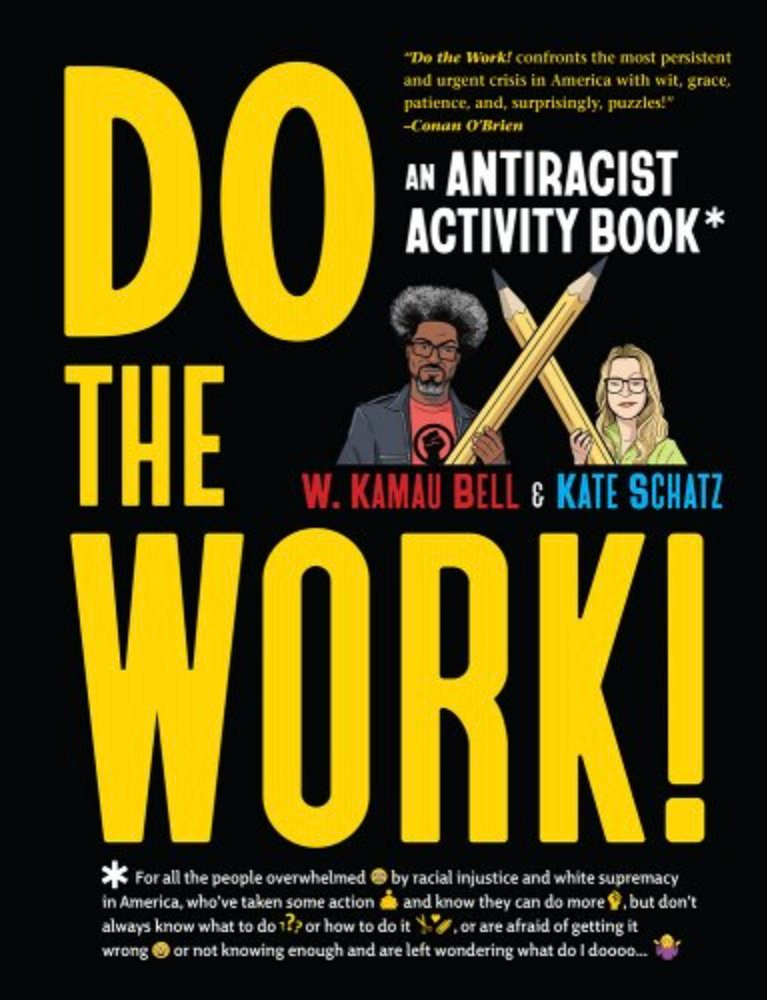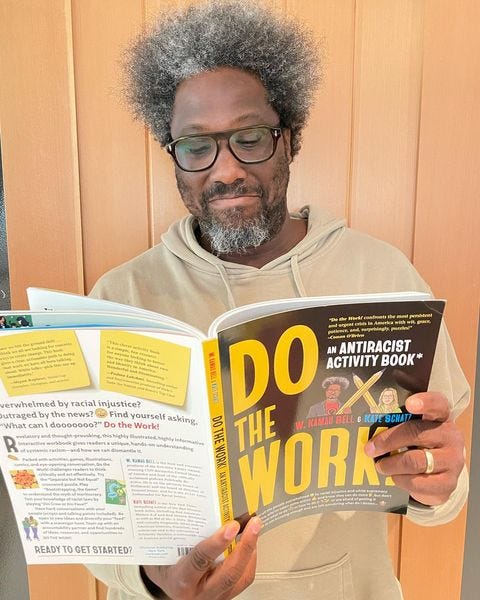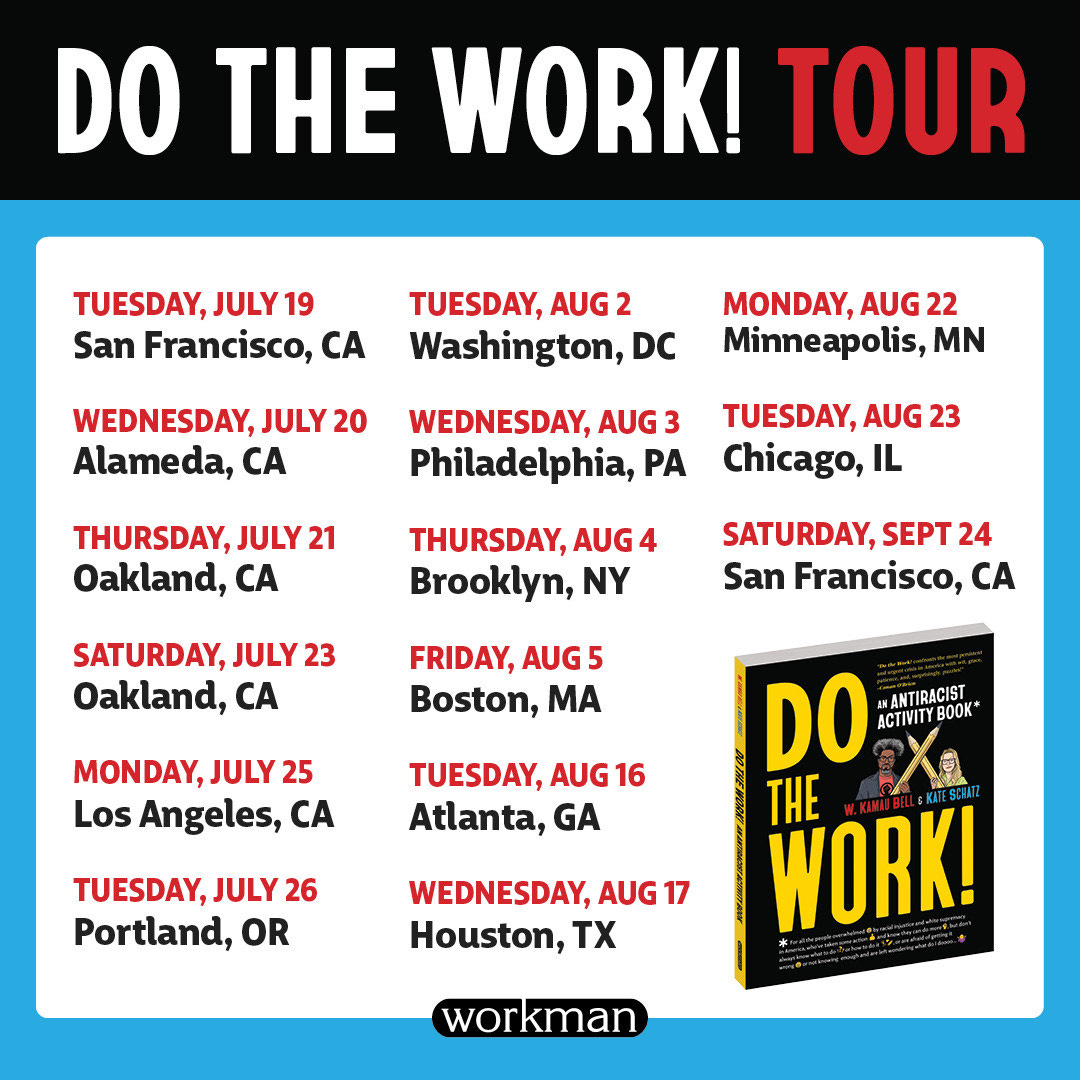“An activist is someone who gives a shit and does something about it”
Or, a conversation with writer Kate Schatz
When I started this newsletter, I wanted to make space for other voices to join me here. Approximately once a month, I’ll share a conversation with someone whose work and mind I admire. Today that someone is the writer Kate Schatz, co-author (with comedian and Emmy winner W. Kamau Bell) of Do the Work!: An Antiracist Activity Book, which comes out on July 19.
Do the Work! is what prompted me to interview Kate Schatz (pronounced “shots”) at this particular moment, but there’s a lot to appreciate about her brain in any season. She is an author, activist, public speaker, educator, consultant, and queer feminist mother who talks, writes, and teaches about race, gender, social justice, and equity. She's the New York Times bestselling author of the "Rad Women" book series (including Rad American Women A-Z, Rad Women Worldwide, and Rad American History A-Z), which have sold over 300,000 copies and been translated into four languages. Also, Kate may have inspired Margaret Atwood to get her first tattoo. Keep reading.
Kate and I became friends through Instagram in late 2019 or early 2020. Like me, she was married for many years to a man, and we met as she was beginning to realize that she would have to end her marriage in order to have the life she needed and wanted. Now she and her soon-to-be wife are, as Kate puts it, “navigating the beautiful and legit challenges of blending families and co-parenting and also the beautiful and legit glory of loving ourselves and each other and having so much fucking fun. Getting to this point has been the hardest, deepest, bestest, thing I’ve ever experienced. The biggest and most worth it challenge I’ve faced. And I’m so proud of us. For being brave, for being honest, for being willing. For being LESBIANS.”
Please enjoy the conversation that follows, which took place on Zoom on June 17. We spoke before the Supreme Court overturned Roe v. Wade, but our conversation feels even more relevant to me now. As Kate, Kamau, Ijeoma Oluo, and countless other writers and activists have noted, reproductive justice is inextricably connected to Black liberation — in other words, the fight for reproductive rights cannot be separated from the work of dismantling systemic racism and ending white supremacy.
What follows has been edited for clarity and (relative) brevity. (You should have seen how long it was before.) Note that all book links go to Black-owned bookstores, a small selection of them that came readily to mind.1 And to Kate: thank you.
Molly Wizenberg: Hi, how are you? You look like you’re emerging from a portal filled with light.
Kate Schatz: I’m at my desk in our attic, and it’s got this funny little nook, so it makes me look like I’m in a weird cave.
MW: I want to dive into talking about the book you’ve made with Kamau. Will you start us out by describing it, in your own words?
KS: Do the Work! is an antiracist activity book— wait. Someone you interviewed on the newsletter recently talked about publishing an adult book. Was it Catherine Newman? Okay, I’m going to reference Catherine. Do the Work! is an antiracist activity book for adults.
MW: So you’re saying it’s X-rated. It’s an X-rated antiracist workbook.
KS: [Laughs.] Well, it is R-rated, because we swear. And when I say “we,” I mean W. Kamau Bell and myself. We wrote the book together as co-authors. It’s an activity book, a workbook, and it’s modeled after those Brain Quest books — you know, the ones you get so that your kid remembers school stuff over the summer, those books that trick them into doing math by, like, drawing some rocket ships. It’s got a little bit of a Highlights for Children vibe. It’s got crossword puzzles and word searches and stickers and lift-the-flaps and pull-out posters.
MW: Yessss.
KS: And it also has really real conversations between Kamau and me about race and racism and white supremacy. It’s focused on giving readers a kind of contemporary and historical context for understanding systemic racism and white supremacy in America. And then it helps people think about strategies for figuring out what to do. It’s full of ideas and suggestions and guidance for what you can do — in your own community, your own house, your workplace — to do something.
MW: I’m glad you mentioned Catherine Newman, because the practical, applied aspects of Do the Work! remind me of her recent books for kids — you know, How to Be A Person and What Can I Say?
KS: And let us be sure to mention that Catherine Newman is one of my favorite people on Earth, and that she was my teacher when I was an undergrad at UC Santa Cruz.
MW: She was? I mean, I knew you both went there, but—
KS: She was a grad student when I was an undergrad. And when I was a freshman and took my very first fiction-writing class in college, she was my teacher. I wrote my first little feminist short stories under the tutelage of Catherine Newman. And then she was my TA for my feminist theory class, when I became a Women's Studies major.
MW: Oh my god.
KS: So I did creative writing and Women's Studies, and she was my TA in both, and I was obsessed with her. I thought she was the coolest.
MW: Did you ever see her, like, leave class on the back of her girlfriend's motorcycle? She mentioned something about that…
KS: I thought she was so cool and hot. And then she moved to the East Coast, and we stayed friends, and then I read Waiting for Birdy when I was pregnant. We’ve stayed in touch for many years.
MW: I love this.
KS: But yes, like Catherine’s books, this book is meant to be practical. Kamau and I like to say that it’s funny, but not fucking around. Kamau is a standup comedian by trade. I'm kind of funny sometimes. We're both people who have used humor for getting people to understand and engage with difficult material. I've done that with my Rad Women books, which intentionally present as fun, cool, bright, colorful American history for young people… and then they’re actually very real about histories. I also did that for a long time as a high school teacher, which involves a lot of kind of trickery, trying to figure out ways to get people to engage with content that they don't really want to engage with.
We also describe Do the Work! as a companion to all the antiracist books that people bought in 2020. It’s not at all in lieu of those. It's a companion. Imagine your stack of books: Ibram X. Kendi, The New Jim Crow, all the important books stacked on your nightstand. This is what you pick up between reading the heavy-duty stuff. You come in here and do a crossword that’s going to give you another way to understand what’s going on.
MW: How did you and Kamau get to know each other?
KS: We were mutual fans. We both live in the East Bay; we’re both parents; and we run in similar East Bay writer-activist circles. When my first book, Rad American Women A to Z came out, I got word that Kamau Bell was a huge fan of it. And I was already a huge fan of his. I used to go see him to standup around the Bay Area. I heard that he was reading [my book] to his daughters, and we connected that way. And then we've supported each other's work and have done a number of events with each other over the years. I started an activist organization called Solidarity Sundays, and he and his wife Melissa got really involved, and they were going to meetings at a Solidarity Sundays chapter near them. And then, in the wake of the murder of George Floyd, I got an email from Kamau saying that he had a lot of white people coming to him, asking what they could do, and he was really sick of trying to explain things to them, and could I please help?
MW: I remember! I spent a lot of time during the summer of 2020 tuning into your Instagram Lives. How do you describe what you were up to that summer?
KS: Yeah, what I was up to was, well— I have been very comfortable for a long time talking openly and honestly about my whiteness and my role as a white person in this world and about racism and antiracism. I’m comfortable talking about that in a way that I recognize is not super common. And I think I’m also good at being responsive in moments of chaos and crisis – figuring out, Alright, what are we going to do? What can I do right now to be impactful and effective? Which is really what this book is about.
But in that moment, well, Kamau went on Conan, and he told Conan that I would be “in charge of [Conan’s] whiteness.” Which led to a whole thing on social media where Conan's team tweeted about me, [and I was on Conan’s show].
And in two weeks I suddenly went from 600 Instagram followers to having, like, 20,000. I genuinely never intended to use social media this way. I'm not an antiracist educator. I'm not trained in it. But I’m privileged to have a platform, and I have access to a lot of resources. So I was like, Okay, I didn't ask for this, but suddenly all these people are paying attention and following, so what can I do that's meaningful?
I don't have it in me to make a bunch of little quotes or little images to put on Instagram — you know, a bunch of slide decks. But I'm good at talking, and I'm not scared of doing it. So one day I said, Okay, new followers: what are your questions [about race and racism and antiracism]? I'll tune in live tomorrow and answer your questions to the degree that I can. And I got such a strong response from people that I just kept doing it.
You know, when I think about that time, sure, I was up here in my attic doing that. But that’s also when I was in the throes of getting divorced. Of totally upending and rearranging my entire personal life. It was a wild thing. I would kind of disappear into my attic, go live, have these conversations and engage with all these people, and then go back downstairs and deal with a whole other kind of radical shifting. But I did that for maybe a month, a month and a half. It wasn’t intended to be an ongoing perpetual thing. And I also had no interest in taking that particular thing to the next level. It was a genuinely organic response to a moment. And then the moment ran its course. But the work, the crisis — it did not run its course. And that's what led us to doing a book. We thought, We kind of had this moment. We’ve got this energy. Let’s make a book. That's what I do.
MW: You put that energy into something that could live outside of you, that could keep doing the work. I want to ask you about collaboration, because you seem to collaborate well. You seem to gravitate toward it.
KS: Here’s how you can tell that collaboration works for me creatively: I published four books in the “Rad Women” series with Miriam Klein Stahl — four books, plus a journal and some accompanying products— all of that, in five years, working together.
MW: That’s a lot.
KS: And Kamau and I have [Do the Work!], and we’re working on a second book, and we’re doing a kid version of this book that will not have swear-words in it. So in the span of six, maybe seven years, I’ll have six books that come out. Well, I’ve been working on one novel by myself for over ten years.
[Both laugh.]
KS: And I’m still in the final edits of it. [Laughs.] So I work better with other people.
And beyond that, I love working in partnership. I like generating ideas with people. I love that feeling when you're working with someone, and you're vibing, and you're bouncing stuff off each other. Even in my fiction writing, with this novel that’s taking me forever, my best work on it has been when I’m actively engaged with a writing partner. I have regular Zoom dates with a couple of friends, and we talk and process. Maybe it’s just the lesbian in me, that I want to talk and process everything. A collaborator is someone you can do that with.
MW: What does activism look like for you? In your bio, the word “activist” is near the top. What does that look like for you? It’s something I think about a lot, because I struggle to be out doing what I think of “activism” looking like. And I wondered what it means for you, especially now that you’re no longer doing Solidarity Sundays.
KS: I really appreciate this question. Your readers didn’t see my face, but I made that, like, awkward-face emoji when you asked it — you know, that grimace. But it’s intentional that I choose to put the word “activist” in my bio. I do it to remind myself that that’s what I do.
Activism can look like a lot of things. I think it’s critical that people expand the way they think of activism — that it happens on a spectrum, like anything else. To me, an activist is someone who gives a shit and does something about it. And that can look like many different things.
My writing, all my work in publishing books — that is my primary mode of activism. I have plenty of moments where I'm like, I'm not doing enough. I'm not part of any organizations. I'm not even showing up to like the social justice committee at my kids’ school. There are many forms of activism that I’m not currently engaged in. But I’ve been writing this book, and that is activism to me. And I also use every platform that I get to talk about what’s going on.
I also think I'm an activist in the way that I'm raising my kids. Talk about the kind of domestic labor that goes unrecognized and unacknowledged in our culture: there’s a lot of domestic activism that we don’t think of as meaningful activism, but it is. I'm raising two white boys and a white girl, or that's the current gender status of our children at the moment, and I'm raising them in a queer household, and I'm raising them having incredible and challenging and intense conversations about about race. That's active. It doesn't show up on Instagram, and it's not in my bio, but that's some serious work that I do as a parent.
MW: Thank you for that answer. On a different note, would you be willing to tell me a bit about the novel you’ve been working on?
KS: It’s set in 1968 in San Francisco, and it's about a teenage girl who gets pregnant and is sent away to a maternity home because abortion isn't legal yet, so it is horrifically timely.
MW: Oh wow.
KS: It's about the reality of pre-Roe life, and specifically about a history that a lot of people, especially younger people, don't know about, which is the history of maternity homes and girls who were sent away to be pregnant in secret and then to surrender their children for adoption. It’s loosely based on my mom's experience of getting pregnant twice in the sixties and surrendering both children for adoption. I've met one of those children, and I’ll meet the other one this summer.
MW: What was that like?
KS: Super, super trippy. It's pretty wild. And it’s a really positive outcome to a story that’s been very difficult — my mom’s experience, a huge amount of shame. So to be able to meet [her children given up for adoption]... these guys are really cool. And we’re so similar. It’s really freaky. These are two men I’d never met in my life, but I’m connected to them because we have the same mom. And the similarities: we’re all left-handed, and we’re all total music snobs, and we have similar music taste. They love old movies, and so does my mom. When we got together, it was, like, hours of us name-dropping old punk bands. They could have been anybody. They could have been boring. But they’re these counterculture weirdos, like my mom, like we are.
MW: I had the experience recently of learning that I have a half-brother that I didn’t know about, and his similarities to our dad and to my other half-siblings… it’s been equally freaky. In a great way.
On yet another different note, what was it like to interview Margaret Atwood?
KS: [Laughs.] Well, it was going to be this beautiful in-person thing in the redwoods at UC Santa Cruz, for the UC Santa Cruz Humanities Institute, and it was scheduled for April 2020. So it obviously got canceled, and then it was over Zoom. It’s funny —between the original date and the rescheduled Zoom date, that was when I was on Conan, and I’ll tell you, I talked to Conan O’Brien and I was just in my attic, like, on my couch. Had I been in the studio with him, I would have been a nervous wreck. And it was the same with Margaret Atwood. Doing it on the computer made it so much easier. I was really overprepared, because she’s notorious for being a very prickly, challenging interview subject. I’d heard multiple accounts of times when an interviewer would ask her a question and she would just say, That’s not a good question. So I over-prepared, and the event starts, and we’re live, and I’ve got my questions ready for her. I was wearing a short-sleeved shirt, and I’m about to ask her my opening question, and she just leans into her computer and says, Oh, I like your tattoos. Can you show me — now, what is that one? And I’m like, Fuck, thousands of people are watching us live and, um, this one’s a spiderweb, and, um, that’s a cat…. And then she just wanted to talk about tattoos for a while.
MW: Does she have any?
KS: No. But she says to me, I don’t have any, but you know, maybe I will. Looking at yours, I think maybe I’ll get a tattoo. And I was like, Margaret Atwood, if you get your first tattoo because of me, I will consider my life’s work done. And then we went on, and I asked her my questions, and she answered them, and it was fine.
MW: You know, I’m thinking — I want to be sure to mention the circumstances under which you and I met, but I want to ask you about it first, because the story is so personal. It’s a lot about your private life. How should I describe how we know each other?
KS: Oh, that your book came into my life and, like, saved it? And then I drank a whole bunch of gin and sent you a bunch of really intense Instagram messages about it.
MW: We can just say that, then. Perfect.
KS: Actually, your book hadn’t even come out yet. But somehow a friend of mine who followed you saw a thing about it and shared it with me, like, Hey, I’m thinking this might be relevant for you. And this happened right in the hardest month of my life, probably, when I was finally getting up the courage to even say the word “divorce” out loud. I hadn’t even said it yet. After I read the description for The Fixed Stars, I approached you [through Instagram] and asked for an advance copy. I needed it immediately. And then I opened it, read one page, and I closed it again. I didn’t touch it for two weeks. This is a kind of anecdote that writers tell a lot, right? And I always think it’s bullshit, but it’s true. Your book sat on a table, and I would walk past it every day and kind of side-eye it, and it was looking at me. I was like, Not yet. That was the feeling I’d had when I opened it — that it was going to tell me the stuff that I knew, but I wasn’t ready [to know it] yet.
MW: I know that feeling: you buy a book because you know you need it, but then to actually read it? That’s a step too far. You can’t touch it. Like it’s too hot.
KS: It was too hot. And then one night, I decided I was ready and I read the whole thing, and I was drinking gin and tonics and just sobbing and then I sent you those very emotional DMs.
MW: I remember it well, because it was a big deal for me, too, getting those DMs. I’d felt so nervous, writing The Fixed Stars. I felt nervous for lots of reasons. One was that, partway through writing it, I learned that Glennon Doyle had almost the same story, and that she was writing a book too, and I thought, Oh god. Now absolutely nobody’s going to read my book. And then I also worried that my story wasn’t “queer enough.” I worried that, for someone who was “really” queer — had been queer for their whole lives, let’s say — my book would seem too straight or naive or square. So it was heartening to know how it affected you, that there were people out there who needed to read [The Fixed Stars] as much as I had needed to write it. . . . And now you’re engaged, Kate!
KS: I’m engaged, and I’m super gay, and I’m very happy.
MW: I love that you’re still in the relationship that sort of catalyzed this life change for you. It’s working out. Things don’t always happen that way. So every time you post about your love, I feel thrilled. I don’t know – it seems cheesy to phrase it that way. But it feeds something in me.
KS: You know, in the same way that you say my response to your book helped you with an anxiety you had, this — what you’re saying — is helpful to me. I’m a very open person, and I’m very extroverted, but I’m also pretty private. When I gained all those followers because of the work I was doing with Kamau, and Conan, I felt very protective of my family and all the players in this whole situation. It’s been a new kind of visibility. I recognize that [visibility] is important, but I have to balance it with my weird feelings about being on the Internet.
MW: I know that feeling well. Hey, is there anything I haven’t asked you about, anything you want to add?
KS: I’m thinking about Do the Work! again. When it comes to the idea of doing the work and how you can be an activist, it doesn’t always have to look like marching in the streets and going to protests and going to meetings. There is a difference between being an activist and being an organizer. I don’t put the word “organizer” in my bio, because that’s not where my work is right now. But you can be an activist in your daily life, in your workplace. I’m pleased with the work we did in the publishing world, through this book. For instance, [when we signed the book contract, we stipulated that] we wanted a Black editor on the team. We wanted a Black graphic designer on the team. We knew it would be a heavily illustrated book, and we asked our publisher to hire only artists and illustrators of color. And that’s what happened. The font we use is from a Black font designer. His company is called Vocal Type. He does typography based on historic activists. This font – [Kate holds up the cover of Do the Work!] – comes from the lettering on the posters for the 1963 March on Washington. So there’s all this granular stuff that we did, and Kamau and I try to really make it visible when we talk about the book.
I think on this book tour, I’ll be talking a lot about being a white person who’s doing a book like this, and what it means to profit off of it. It’s super complicated. A lot of people will think I should not [make or profit from a book about race and antiracism]. I would say that I'm profiting off my own labor and research and all the work that I did to write it, but I can't escape the fact that I'm a white person stepping into this space. But, I'm going to be a writer, and I'm going to write books, so I can choose to not step into the space at all and completely avoid it, or I could use the privilege that I have, and the pull and the power that I have in the publishing industry, where people listen to me and give me book deals, to hold the door open and get as many people in as I can.
It doesn't take that much work. You know, when we told our the team that we'd like to hire a graphic designer who is a Black woman, they're like, Great, um, do you know anybody? It took me about an hour to reach out to contacts, get some recommendations, and then I’m like, Here’s a list of incredible people and links to their work. And they’re like, Oh, well, we've never heard of any of these people. And we said, Well, now you have, right? We're gonna hire one of them. And now you also have a whole list of other people that you could possibly hire.
MW: That's fantastic. Whatever field we’re in, we can do that.
KS: That’s the thing. Whatever field you’re in, whatever it is you do, there are ways to be impactful. White supremacy and racism permeate every aspect of this country. You don’t have to, like, learn a whole new way of being an activist. You say you don’t have time? That’s fine. You can still be doing stuff.
MW: It’s a matter of changing the way you think — adding one or two steps to the way you operate.
KS: And in Do the Work!, we made this big list of actions you can take, and it actually folds out. It’s all ideas, front and back.
MW: When will the kids’ version be out?
KS: It'll probably be spring 2024, global pandemics and shipping crisis notwithstanding. And it's gonna be a different book. It's not just going to be this book with the swear words taken out. For one really important reason, it's not going to be an activity book. It will be similar, but it's really important for us that the young people's book be in libraries and in schools, and if it is an interactive activity book that you’re supposed to write in, libraries don’t stock it. When it comes to accessibility and publishing, libraries are critical. The adult Do the Work! won’t be in libraries, because you’re supposed to write in it and tear stuff out. But with the book for kids, we’ve got to get it into public libraries.
MW: So we won’t find Do the Work! in our local library — that’s important to note.
KS: So you have to buy it, yep. And if you preorder it — anytime before July 19 — you can get a tote bag, too! It says END WHITE SUPREMACY. You can preorder the book anywhere you want, and then you go to this website, and you fill out a little form where you put in your order number, and then you’ll get a tote bag and pencil.
MW: I’m very motivated by a good tote bag.
KS: It’s pretty rad. My sweet older neighbor was like, I preordered your book! I can’t wait for my tote bag! And I can’t wait to see Connie with her END WHITE SUPREMACY bag at Safeway.
If you love a Black-owned bookstore that I haven’t thought to link to in this newsletter, by all means, please preorder your book there instead! Buy this book from Black-owned bookstores, is what I’m saying.




